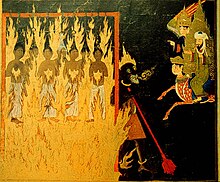az-Zabaniyya
The Zabaniyya , Arabic الزبانية, DMG az-zabānīya , are beings in Islam who are strictly associated with the angels of hell and are mostly identified with them. In some cases it is also the terrifying companion of the Angel of Death . Unlike the angels of grace, who are generally considered to be made of Nur (light), the angels of punishment are made of Nar (fire). They are mentioned in the Koran in sura 96 : 18 (after Rudi Paret ):
- "We will (for our part) summon the henchmen (of Hell) (?)."
They are described elsewhere in the Koran - without mentioning their name - as raw ( ġilāḏ ) and violent ( šidād ) (66: 6):
- “You believers! Watch out for yourself and your loved ones in front of a fire, the fuel of which consists of people and stones, and over which there are harsh and severe angels who do not rebel against God in what he has commanded them, but rather do what they are ordered. "
With reference to the Koran (74:30), it is assumed in the Islamic world that there are a total of 19 Zabaniyya. There it says: "Nineteen (angels) are appointed (as guards) over them." When it comes to the fight against the angels of grace, it would trigger a thunder-like bang.
Word origin
Contrary to the traditional interpretation, the German orientalist Günter Lüling assumes a (later) misspelling or misreading of the word in the Koran and postulates a possible original formالرّبّانية, DMG ar-rabbānīya , meaning "ruling angel ". The rasm of both terms is identical in Arabic, the difference is based only on the (much later introduced) diacritical punctuation . Accordingly, sura 96:18, which also caused problems for Rudi Paret when translating, would be read as follows:
- "For our part, we will call the highest angels (" rulership angels ")."
With the meaning “ angel of rule” the word is identical with the (Greek) biblical term kyrioi (2 Peter 2:10; translated as “angelic majesties” in the New American Standard Bible ), which in the formالرّبّونية, DMG ar-rabbūnīya , in the same context in an Arabic-Christian manuscript from the St. Catherine's Monastery on Mount Sinai .
Al-Mubarrad traces the term back to a class of underworld demons that have been called ifriyya zibniyya . The expression zibniyya would mean something like "bump". The repulsion of the fleeing inmates into hell would be characteristic of these demons and were therefore given this name.
literature
- David Bruce Macdonald: Malā'ika . In: Arent Jan Wensinck , Johannes Hendrik Kramers (Hrsg.): Concise dictionary of Islam . Brill, Leiden 1941; ISBN 90-0-404-916-9 (reprinted 1976).
- Adel Theodor Khoury : Angels . In: Adel Theodor Khoury, Ludwig Hagemann , Peter Heine (eds.): Islam-Lexikon. Herder, Freiburg im Breisgau 2006, ISBN 3-451-04036-0 .
- The Encyclopaedia of Islam . New Edition. Brill, Leiden, Volume 9, p. 368.
- Günter Lüling : A Challenge to Islam for Reformation. The Rediscovery and Reliable Reconstruction of a Comprehensive pre-Islamic Christian Hymnal hidden in the Koran under earliest Islamic Reinterpretations , Motilal Banarsidass Publishers, Delhi, 2003.
Individual evidence
- ↑ MONA ZAKI JAHANNAM IN MEDIEVAL ISLAMIC THOUGHT 2015 p. 205 ff
- ↑ Jane Dammen McAuliffe Encyclopaedia of the Qurʾān Volume 3 Georgetown University, Washington DC p. 45 (English)
- ^ Hans Wilhelm Haussig, Egidius Schmalzriedt Dictionary of Mythology Klett-Cotta 1965 ISBN 978-3-129-09870-7 p. 314
- ↑ a b Lüling, 2003, pp. 71-87
- ↑ cf. also ( Mk. 10,51 ): “And Jesus answered and said to him, What do you want me to do for you? The blind man said to him: Rabbuni, that I can see again! "The term" Rabbuni "is to be understood here as" Lord / Ruler / Master ".
- ↑ Lange, Christian. "Revisiting Hell's Angels in the Quran." Locating Hell in Islamic Traditions edited by Christian Lange, Brill, LEIDEN; BOSTON, 2016, p. 82 JSTOR, www.jstor.org/stable/10.1163/j.ctt1w8h1w3.10.
